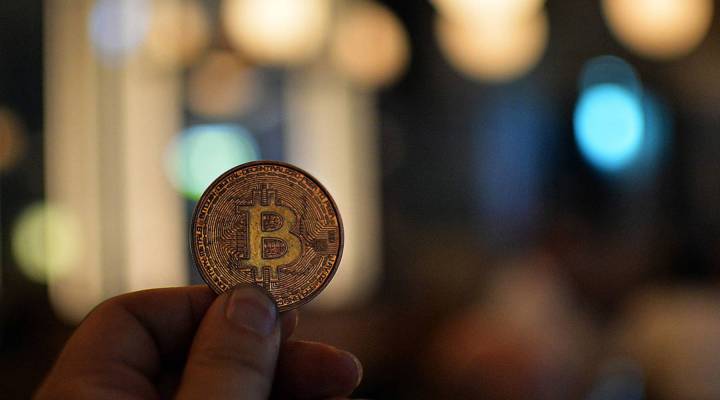
5 things you need to know about bitcoin

In the past few weeks, we’ve seen the price of bitcoin rise dramatically, climbing thousands of dollars in just days, and sparking a lot of conversation. But what is bitcoin, and how does it work? Marketplace Weekend spoke to Marketplace Tech host Molly Wood about the cryptocurrency — here are five things you need to know:
1. What is bitcoin?
Bitcoin is an encrypted digital currency, sometimes called a cryptocurrency, and it’s a global payment system. It’s built on top of a technology called blockchain, which is essentially a virtual ledger that keeps track of every transaction. One of the reasons it’s interesting is that no one person, computer or entity controls bitcoin, and the ledger is publicly distributed, so in theory, anyone can track the transactions to verify that they’re real. At the time of our recording, 1 bitcoin is equivalent to $16,532.60.
2. Who owns bitcoin?
Right now, mostly speculators and investors have bitcoin, and there aren’t very many of them. Financial analysts actually estimate that only about a thousand people own 40 percent of all the bitcoin in the world. It’s a little hard to estimate how many people own bitcoin — when you own it, it’s assigned to your digital bitcoin address, which is really just like an encryption key. And one person can have several addresses. But best guess is that between 2 to 4 million people own a least some fraction of a bitcoin, and that number may be as high as 15 million people.
3. Why is bitcoin so volatile?
That is basically the single enduring question of the whole bitcoin story. One reason might be because so few people control so much. Any move by one of these bitcoin whales, or maybe even a group of them, can have a huge impact on the supply and price. It’s utterly unregulated and has no real infrastructure to speak of. It might be better now that it’s trading on actual exchanges like the CME, but prior to that you could have entire bitcoin exchanges get hacked or go down overnight and lose the records of bitcoin ownership and throw the market into complete chaos. And we can’t forget the very high likelihood of fraud and manipulation on some exchanges. It might get bad press because it’s used to pay off hackers in ransomware attacks and everyone might sell. Bitcoin is basically brand new and suddenly worth tons of money and you should assume that anything and everything will happen.
4. How real is bitcoin … and what makes bitcoin real?
Bitcoin is real as a financial asset because people say it is. But as a cryptocurrency, it’s real because there’s a finite number of bitcoin — there’s a record of each one that’s created, or mined. And there’s this digital record of all the transactions in the block chain. So actually compared to something like a hundred dollar bill, which has a serial number but can disappear for years after that and then show up all covered in powdered cocaine, bitcoin is pretty real.
5. What’s the future of cryptocurrency?
This is a good place to note that bitcoin is not the only cryptocurrency built on blockchain technology and it won’t be the last. The tech enables all kinds of things to happen. A common example is a smart contract, or a self executing contract between two parties which automates transactions. The easiest example would be if someone used say, Ether, a cryptocurrency that runs on a network called Ethereum, to pay for a package. Their side of the contract would communicate with Fedex’s tracking system and when and, only when the package was delivered, it could trigger payment to the merchant. It can of course get way more complicated from there. The future is really less about Bitcoin — or any individual currency — and more about this decentralized, computerized ledger technology that can potentially have a huge impact on all kinds of financial transaction. It requires no middlemen, and no gatekeepers and no profit takers … just computerized, traceable, verifiable transactions. This is something that is sometimes actually called the Internet of Agreements.
There’s a lot happening in the world. Through it all, Marketplace is here for you.
You rely on Marketplace to break down the world’s events and tell you how it affects you in a fact-based, approachable way. We rely on your financial support to keep making that possible.
Your donation today powers the independent journalism that you rely on. For just $5/month, you can help sustain Marketplace so we can keep reporting on the things that matter to you.












